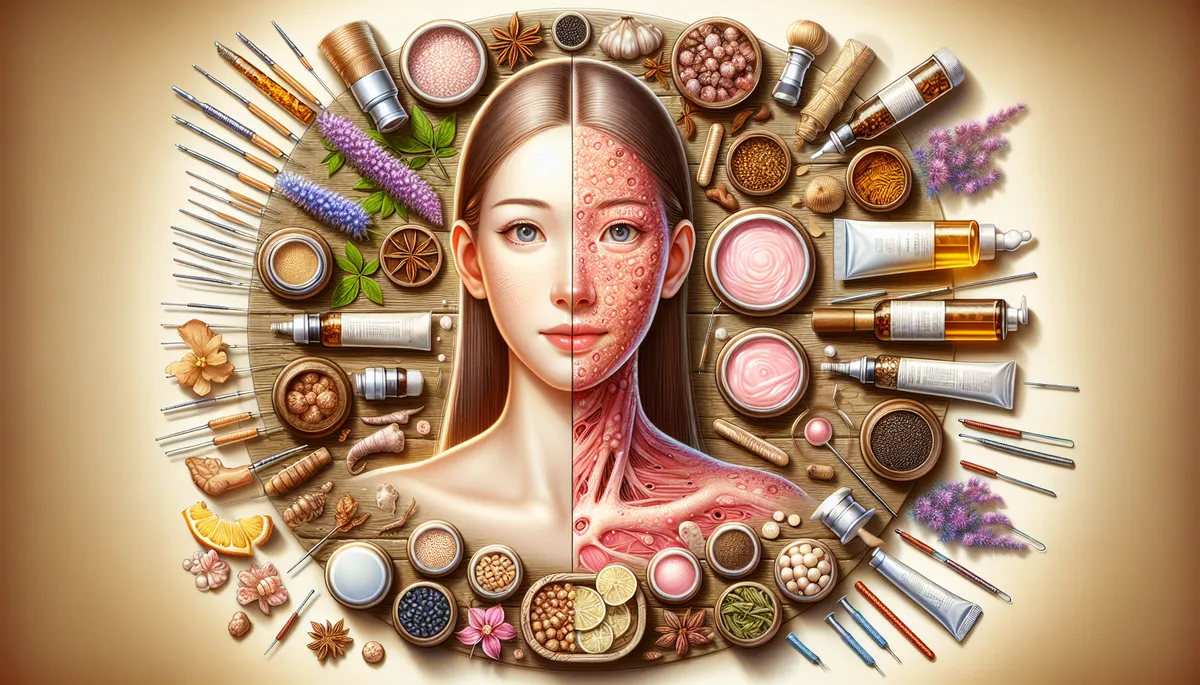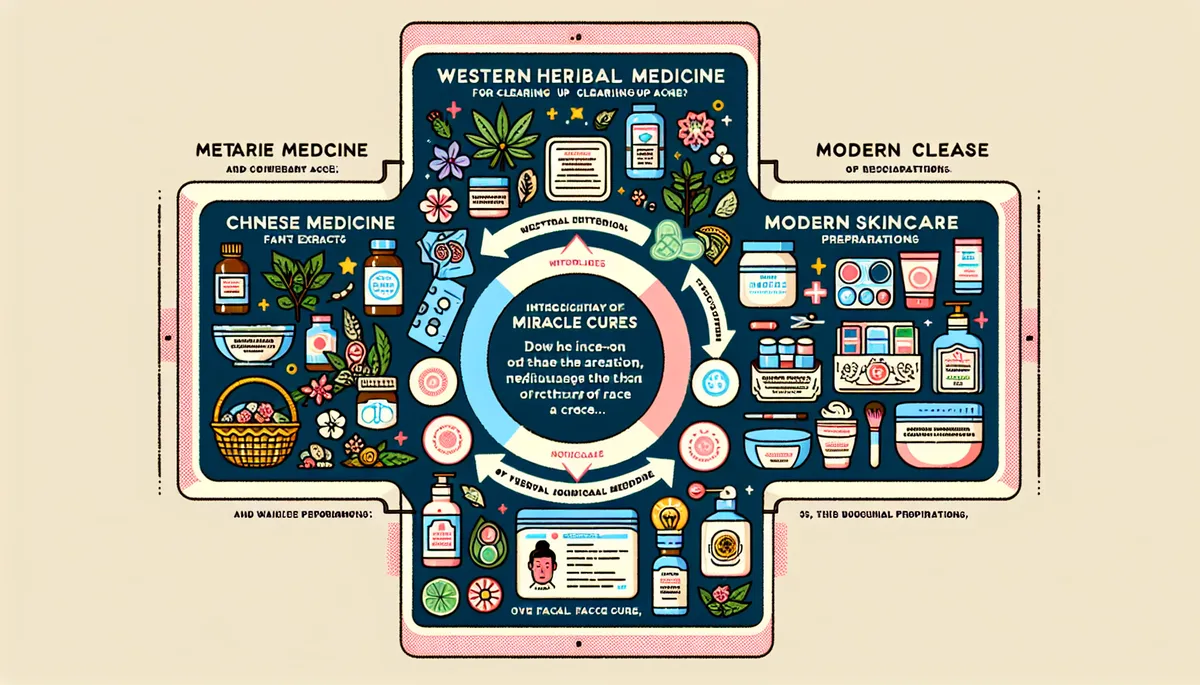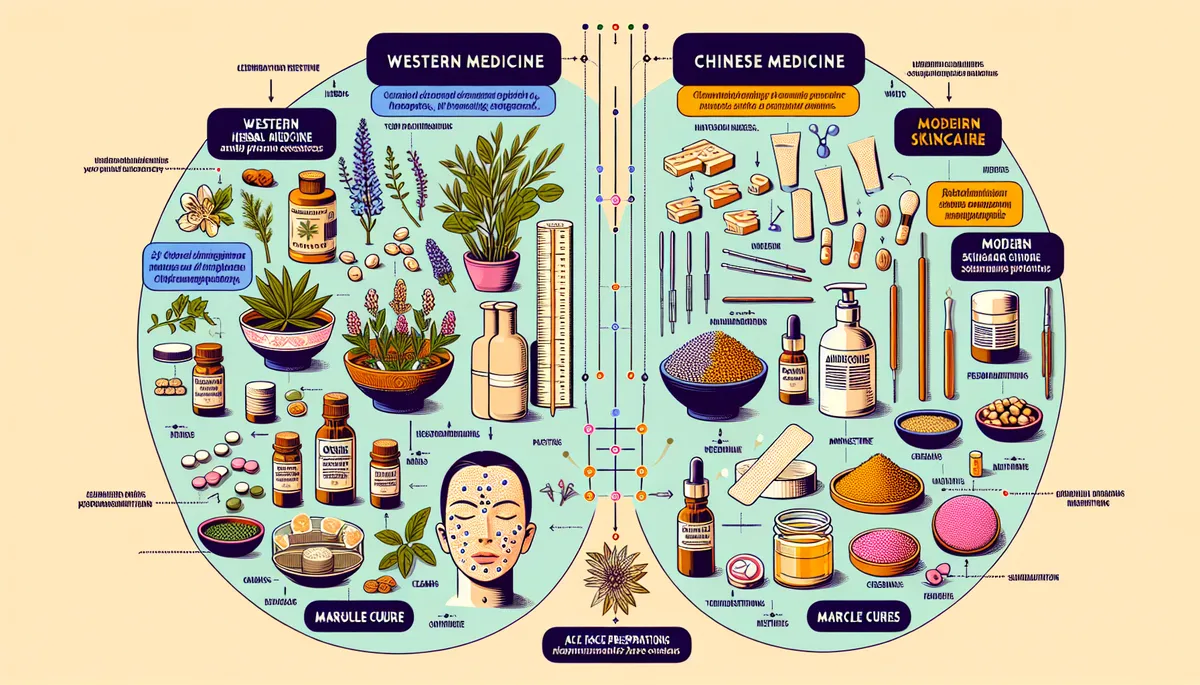How To Treat Sensitive Skin? Skip
Frustration, Take Informed Action...
Skintegratit - Sensitive Skin

Learn how to treat sensitive skin with the 3-WCM integration:
Western herbal medicine, Chinese medicine and Modern, non-prescribed, skincare preparations. O.k...
Fellow sensitive skin sufferers! We know the struggle is real. That tight, itchy, burning feeling? The redness, the dryness, the sudden breakouts that seem to emerge unexpectedly.? Ugh. We've all been there...
You've probably tried countless products promising miracle cures, only to be left with more irritation and a thinner wallet. But don't give up hope!
This isn't just another quick-fix article...
We're going deep, exploring how to truly treat sensitive skin by integrating three powerful approaches: Western herbal medicine, Chinese medicine, and modern skincare. First,
Let's address the burning question: what is sensitive skin?
It's not a medical diagnosis in itself, but rather a descriptive term for skin that reacts easily to various triggers. These triggers can range from skincare products and environmental factors (like sun and wind) to internal factors like stress and hormonal changes. Signs of sensitive skin can include redness, itching, burning, dryness, and a tendency to break out. Now,
Before we dive into treatments, it's crucial to understand that there's no one-size-fits-all solution.
Just like a fingerprint, your skin is unique.
That's why getting an individual diagnosis within each of the three categories we'll discuss is paramount. This personalized approach is key to finally understanding how to treat sensitive skin effectively and achieve long-lasting relief. O.k.?
Let's start...
Western herbal medicine for sensitive skin...

The "W" of the 3-WCM powerful integration:
Western herbalist will consider a wide range of factors contributing to your sensitive skin. They'll likely ask about your diet, lifestyle, stress levels, and any other health conditions you may have. This holistic approach recognizes that skin health is intricately connected to overall well-being. For instance,
Digestive issues can manifest as skin inflammation, while hormonal imbalances can trigger breakouts or increased sensitivity. By addressing these underlying imbalances,
Western herbal medicine aims to treat the root cause of your sensitive skin, not just the surface symptoms.
Western herbal medicine recognizes a variety of sensitive skin symptoms beyond the typical redness, itching, and burning. These can include reactions to specific substances like certain fabrics or metals, increased sensitivity to temperature changes (both hot and cold), and even emotional triggers like stress or anxiety that exacerbate skin reactions.
Some individuals might experience a stinging or prickling sensation, while others might notice their skin feels tight or stretched, even after moisturizing.
Understanding these nuanced symptoms is crucial for developing a personalized treatment plan.
Imagine finally pinpointing the specific environmental triggers that cause your skin to flare up or learning how to manage stress-induced skin reactions through herbal remedies.
This deeper understanding empowers you to take control of your skin health and improve your overall quality of life.
The beauty of Western herbal medicine lies in its gentle yet powerful approach. Herbs are carefully selected based on their individual properties and combined to create synergistic formulas tailored to your specific needs...
Treatment might involve herbs like chamomile and calendula, known for their soothing and anti-inflammatory properties. Think calming chamomile tea compresses or creams containing calendula extract. Dietary changes, such as eliminating inflammatory foods, could also be recommended.
Beyond chamomile and calendula, other commonly used herbs for sensitive skin include lavender for its calming and antiseptic properties, aloe vera for its soothing and moisturizing effects, and gotu kola for its ability to promote skin repair and reduce inflammation. These natural remedies work in harmony with your body to restore balance and promote healing from within. They offer a safe and effective alternative to harsh chemicals often found in conventional skincare products, which can further irritate sensitive skin.
Imagine a life free from the constant worry of skin reactions. Picture yourself confidently trying new foods, exploring new environments, and engaging in activities you love without the fear of triggering a flare-up.
By embracing the wisdom of Western herbal medicine, you can unlock the potential for truly healthy, resilient skin. Remember,
It's not just about treating the symptoms; it's about cultivating a deeper connection with your body and understanding its unique needs.
This holistic approach empowers you to take control of your skin health and live a more vibrant, fulfilling life, free from the limitations of sensitive skin. But, is it enough?
Clear skin is not just about aesthetics; it's about feeling confident, comfortable, and healthy in your own skin.
That's why you'd better treat it more powerfully by integrating with the full 3-WCM integration. Hey,
We need to make sure you're getting real, long-lasting results. Right?
Next up: Chinese medicine...
The "C" of the 3-WCM powerful integration:
This ancient practice views sensitive skin as an imbalance of Qi (vital energy) and blood flow, potentially linked to organ disharmony. A Chinese medicine practitioner might diagnose your sensitivity as arising from "heat" in the skin or a deficiency in certain meridians (energy pathways).
Treatment could involve herbal formulas, or dietary adjustments. For example,
Cooling herbs like chrysanthemum and honeysuckle might be prescribed to address "heat" in the skin. Dietary recommendations might focus on balancing yin and yang energies through specific food choices. In other words...
Sensitive skin isn't merely a superficial issue; it's a reflection of internal imbalances.
These imbalances can manifest as various syndromes, each with its unique set of symptoms. For instance,
Wind Heat presents with redness, itching, and a burning sensation, often accompanied by a feeling of heat in the skin. This syndrome may be aggravated by external wind or heat, spicy foods, and emotional stress.
Damp Heat manifests as redness, itching, and greasy skin, potentially with pustules or small bumps. This type of sensitivity can be worsened by humid weather, greasy foods, and emotional frustration.
Understanding these distinctions allows for a more targeted approach to treatment. A skilled practitioner can differentiate between these syndromes and prescribe specific herbs to address the underlying imbalance. Beyond "Wind Heat" and "Damp Heat," other syndromes can contribute to sensitive skin.
Blood Deficiency can lead to dry, thin, and easily irritated skin, often accompanied by pale complexion and fatigue. This syndrome requires nourishing herbs and foods to replenish blood and improve skin resilience.
Yin Deficiency manifests as dry, red, and itchy skin, especially at night, often with a feeling of heat and restlessness. Addressing this syndrome involves nourishing Yin and clearing heat through herbs, diet, and lifestyle adjustments.
Qi Stagnation can cause uneven skin tone, dull complexion, and sensitivity due to impaired circulation and detoxification. Treatment focuses on promoting the smooth flow of Qi and blood through herbs, and exercise.
By recognizing these various syndromes, Chinese Medicine offers a nuanced understanding of sensitive skin and its underlying causes.
The diagnostic process in Chinese Medicine involves observing your tongue and pulse, inquiring about your symptoms, and considering your emotional temperament, body temperature, and overall constitution. For example,
A person with "Wind Heat" might have a red tongue with a thin yellow coating and a rapid pulse. Or
Someone with "Damp Heat" might have a red tongue with a greasy yellow coating and a slippery, rapid pulse.
These diagnostic tools help practitioners pinpoint the specific imbalances contributing to your sensitive skin. Furthermore,
Chinese Medicine recognizes the interconnectedness of mind and body.
Emotional factors like stress, anger, and frustration can exacerbate skin sensitivities. By addressing these emotional imbalances through practices like meditation and mindful breathing, you can further support your skin health.
Imagine finally understanding why your skin reacts the way it does.
Picture yourself armed with the knowledge to make informed choices about your diet, lifestyle, and skincare routine.
By embracing the wisdom of Chinese Medicine, you can embark on a journey of self-discovery and reclaim your skin health. It's not just about alleviating symptoms,
it's about cultivating a deeper understanding of your body and its intricate workings.
This journey may involve dietary adjustments, such as reducing spicy or greasy foods, incorporating cooling and hydrating foods, and prioritizing regular meal times.
Lifestyle changes like stress management techniques, adequate sleep, and regular exercise can also significantly impact your skin health. By integrating these principles into your daily life, you can create a supportive environment for your skin to thrive. So, as you can see
This holistic approach empowers you to take control of your well-being and live a more vibrant, fulfilling life, free from the limitations of sensitive skin. But,
As you know by now...
We're not going to stop here!
Let's see how to integrate these 2-wisdom approaches with safe Modern science. As we can't stress this crucial point enough...
Clear skin is not just about aesthetics; it's about feeling confident, comfortable, and healthy in your own skin. So,
We definitely need to make sure you're getting real, long lasting results. So,
Finally, let's talk about modern skincare with non-prescribed preparations.

The "M" of the 3-WCM powerful integration:
Dermatologists and estheticians can assess your skin type and identify specific sensitivities, such as reactions to certain ingredients or environmental factors. They can also help differentiate between sensitive skin and other skin conditions like eczema or acne.
Sensitive skin treatment in this category often involves using gentle, fragrance-free cleansers and moisturizers specifically formulated for sensitive skin.
Avoiding harsh chemicals and irritants is crucial.
Your skincare professional might recommend products containing ceramides, hyaluronic acid, or niacinamide to strengthen the skin barrier and reduce inflammation. Finding the right face wash for sensitive skin is a great starting point.
Navigating the world of skincare can feel overwhelming, especially when you have sensitive skin. But,
understanding the active ingredients in products can empower you to make informed choices and curate a routine that truly works for you. So,
Let's explore some key ingredients to look for and why they're beneficial...
Ceramides are lipids naturally found in your skin's barrier. They help retain moisture and protect against irritants. Look for cleansers, moisturizers, and serums containing ceramides to reinforce your skin's natural defenses.
Hyaluronic acid is a humectant, meaning it draws moisture from the air to your skin, keeping it hydrated and plump. It's a fantastic ingredient for all skin types, especially sensitive skin, as it helps soothe dryness and reduce the appearance of fine lines.
Niacinamide, a form of vitamin B3, is a powerhouse ingredient with multiple benefits. It helps calm redness, reduce inflammation, and improve skin tone. Look for niacinamide in serums, moisturizers, and even some cleansers.
Beyond these star ingredients, there are other gentle and effective options to consider...
Aloe vera, known for its soothing properties, can be found in gels, lotions, and cleansers. It helps calm irritation and promote healing.
Oatmeal, another natural soother, can be found in bath products and some cleansers. It helps relieve itching and reduce inflammation.
Chamomile, often found in teas and skincare products, possesses anti-inflammatory and antioxidant properties, making it ideal for calming sensitive skin. Look for chamomile in cleansers, toners, and masks. Finally,
Green tea extract, rich in antioxidants, can help protect your skin from environmental damage and reduce redness.
Now, let's translate this knowledge into practical product choices...
When choosing a cleanser, opt for fragrance-free, sulfate-free formulas designed for sensitive skin. Look for creamy or milky textures that won't strip your skin's natural oils.
For moisturizing, choose a fragrance-free, hypoallergenic moisturizer rich in ceramides, hyaluronic acid, or other soothing ingredients. Avoid heavy creams or lotions that could clog pores.
If you use sunscreen, which is crucial for protecting sensitive skin, opt for mineral-based sunscreens containing zinc oxide or titanium dioxide. These are less likely to irritate sensitive skin compared to chemical sunscreens.
And if you enjoy using makeup, choose hypoallergenic, fragrance-free products specifically formulated for sensitive skin.
Building a skincare routine for sensitive skin is a personal journey.
Start with the basics: a gentle cleanser, a hydrating moisturizer, and a mineral sunscreen.
Once you've established a foundation, you can gradually introduce other products, like serums or masks, one at a time. Pay close attention to your skin's response to each new product. If you experience any irritation, discontinue use immediately. Remember,
Less is often more when it comes to sensitive skin. A simple, consistent routine with gentle, effective ingredients can make a world of difference.
By understanding the active ingredients and choosing products wisely, you can transform your skincare routine from a source of frustration to a source of empowerment.
Imagine waking up each morning with calm, comfortable skin, ready to face the day with confidence.
Imagine enjoying the simple pleasures of trying new products without the fear of reactions. This is the power of knowledge. This is the path to a happier, healthier you. So,
embrace the journey, experiment with different products, and discover the joy of a skincare routine that truly nourishes and supports your sensitive skin. Now,
here's where the magic happens...
How To Treat Sensitive Skin? The Powerful 3-WCM Integration...

integrate these three powerful approaches: Western herbal medicine, Chinese medicine and Modern skincare. That's the key to truly transformative results.
Let's look at this example...
Suppose you're diagnosed with sensitive skin due to digestive imbalances in Western herbal medicine, "heat" in the skin due to heat in the blood in Chinese medicine, and a compromised skin barrier in modern skincare.
An integrated treatment plan might include: nutritional approaches to enhance digestive function based on Western herbal medicine (for example, incorporating easily digestible foods alongside a soothing chamomile tea), a dietary regimen to cool the blood according to Chinese medicine (for example, emphasizing cooling foods such as watermelon and cucumber), anti-inflammatory medicinal herbs that benefit the digestive system following Western herbal practices (for example, using slippery elm preparations), and medicinal herbs for cooling the blood in line with Chinese medicine (for example, utilizing honeysuckle extract). and using a gentle cleanser and ceramide-rich moisturizer (modern skincare). Remember,
How to treat sensitive skin effectively involves more than just slapping on a cream. It's about understanding the root causes of your sensitivity and addressing them from multiple angles.
You must get an accurate diagnosis for each of the 3-WCM methods in order to choose the treatment strategy that is perfectly suited to you!
Now, let's explore different forms of sensitive skin and their treatment across the three categories.
Dry and sensitive skin often benefits from hydrating herbs like marshmallow root (Western herbs), nourishing foods like bone broth (Chinese medicine), and humectant-rich moisturizers (modern skincare).
Oily and sensitive skin can be tricky. Western herbal medicine might recommend cleansing herbs like burdock, Chinese medicine might suggest balancing internal dampness, and modern skincare might focus on oil-free, non-comedogenic products. Finding the right acne treatment for sensitive skin is essential in this case.
As far as modern skincare goes,
Building a skincare routine for sensitive skin takes time and experimentation. Always patch test new products. Start by eliminating potential irritants, introduce new products one at a time, and pay close attention to your skin's reactions. Remember,
Finding the right "skincare products for sensitive skin" is a journey, not a destination. Be patient with yourself and your skin. And
Don't be afraid to seek professional guidance.
A Western herbalist or Chinese medicine practitioner can provide personalized recommendations based on your individual needs.
Understanding the causes of sensitive skin by these approaches will empower you to make informed choices. Common culprits include genetics, environmental factors, and underlying health conditions. Also,
Recognizing sensitive skin symptoms early on can help prevent further irritation. Pay attention to any redness, itching, burning, or dryness right when it starts. One more time...
Finding the right sensitive skin treatment is about more than just managing symptoms. It's about restoring balance and promoting long-term skin health.
By integrating the powerful 3-WCM integration: Western herbal medicine, Chinese medicine, and Modern skincare, you'll create a holistic approach that addresses the root causes of your sensitivity.
Remember, you're not alone in this journey.
Millions of people experience sensitive skin. We are here to help and there are effective solutions available.
Don't let sensitive skin hold you back...
With the right knowledge and tools, you can achieve the healthy, radiant complexion you deserve. So,
Take a deep breath, embrace the journey, and get ready to say goodbye to sensitive skin struggles.
You've got this!
Now that you have a better understanding of how to treat sensitive skin, take the next step and schedule consultations with practitioners in each of the three categories discussed. Your journey to happy, healthy skin starts now!
Valuable Info & More Resources For
Sensitive Skin
Modern Skincare:
1. American Academy of Dermatology (AAD): The AAD offers comprehensive articles on sensitive skin, its causes, symptoms, common skin diseases due to skin sensitivity and treatments, all reviewed by board-certified dermatologists.
Herbal Medicine:
2. National Institute of Health's National Center for Complementary and Integrative Health (NCCIH): The NCCIH provides evidence-based information on complementary and alternative medicine, including herbal remedies. They have resources on safety, efficacy, and potential interactions.
Chinese Medicine:
3. National Center for Biotechnology Information (NCBI) - PubMed: This database allows you to search for scientific studies on Chinese medicine for sensitive skin. Look for clinical trials and systematic reviews for the most reliable evidence.